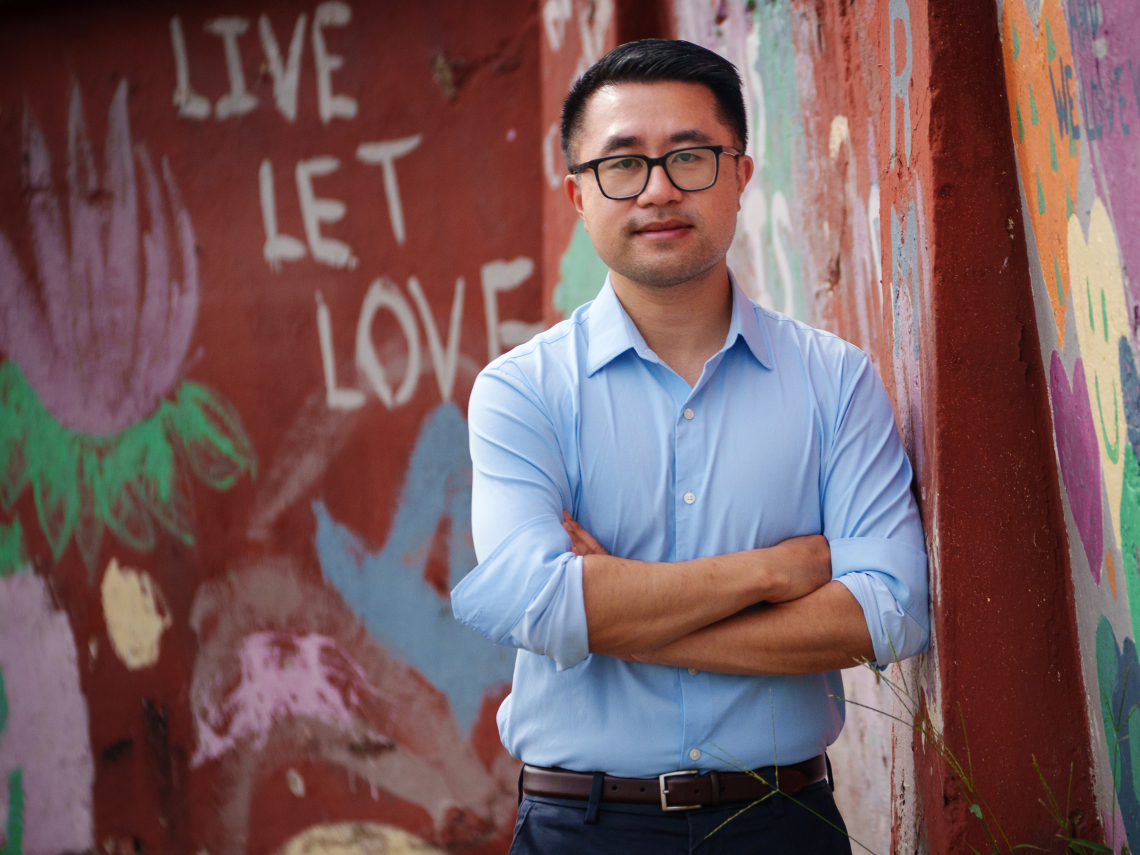Cara August, Trinity Communications

“How do police departments resist institutional reforms?”
That is a question Tony Cheng, assistant professor of Sociology, poses in his forthcoming first book, “The Policing Machine: Enforcement, Endorsements, and the Illusion of Public Input.”
The book is based on nearly two years of ethnographic data Cheng collected in New York City, attending community meetings, church events and local protests to study how the New York Police Department (NYPD) unequally distributes power and privileges to neighborhood groups in two Brooklyn precincts —a strategy that enables police to cultivate political capital and resist change.
Growing up in a suburb of New York, Cheng spent a lot of time as a young person exploring and navigating city life.
“It's no coincidence that I was interested in studying the NYPD as a case study for my research,” Cheng said.
As a high school student, Cheng became interested in criminal justice and enrolled in summer courses about the sociology of crime and deviance. “That sounded cool,” he said. “Those kinds of courses weren't offered in my high school, and I knew I wanted to go to law school.”
He did attend law school — in between the years he spent earning a Ph.D. in sociology from Yale — though he never practiced criminal law. “I always thought getting a law degree would be helpful in studying inequality and the politics of policing,” he said.
Many of Cheng’s internships and work experiences, including community organizing and legal services work, were also based in New York and tended to involve a prominent level of police presence.
As a law student at New York University in the mid-2010s, a time that included many controversial and highly publicized police shootings across the United States, Cheng wanted to learn more about the legal landscape surrounding police violence and policing policies.
Initially, Cheng’s vision for a study was to interview officers and embed himself within the police department. "The NYPD denied me access over the course of several months, so I had to turn to more public data sources. The study was more interesting because of that,” he said.
In one part of the study, Cheng attended public “police-community meetings” and compared field notes and recordings of what residents said in the meetings to what the officers recorded — and then what those complaints actually looked like when internalized in organizational documents. In addition to those first-hand observations, the study also includes analysis of precinct social media feeds, department issued event permits, decades of reports and transcripts from public meetings and records on the distribution of department resources.

Over time, Cheng noticed the ways in which the NYPD, America’s largest police force, was curating the public’s complaints as a means of resisting institutional reforms. By exercising their discretion across multiple decision-making stages to frame, translate and record community complaints as endorsements of their services, a concept known as “cumulative discretion” — the NYPD can assert its public legitimacy without sacrificing its organizational independence.
“After every major controversy or shooting or episode of police violence, we often emphasize the importance of building and improving police-community relationships,” Cheng said. “The point I try to make in the book is that those relationships do not need to be built. Instead, those that already exist are exactly what is impeding police transformation.”
The research illustrates how, when city hall calls for changes or oversight, police department leadership can point to certain curated constituent relationships as evidence of how incredibly satisfied they are with police services and how they don't want police reform.
“The term ‘hard to reach population’ is often associated with marginalized populations,” Cheng said. “But institutional actors, like police, are also hard to reach populations, but, of course, for very different reasons that have to do with power and access."
Power and access are topics that Cheng will explore in the classroom at Duke this spring when he’ll teach a course on the politics of policing. “I think there's a lot of interest among students on the topic,” he said.
Students in the class will select a topic in policing and create their own policy proposal projects over the semester, allowing them to self-direct what aspect of policing they want to focus on.
“There are students who are super critical about the criminal justice system and about policing who are definitely welcome,” Cheng said. “There are others who may want to become officers, and they are also welcome. The goal is to present diverse perspectives on these timely topics.”
New to Durham, Cheng looks forward to getting to know the Bull City and is excited to be returning to a sociology department, having previously taught in the University of California, Irvine’s criminology department. “I enjoy thinking about questions broadly,” he reflected, “and about how they affect society.”